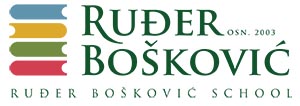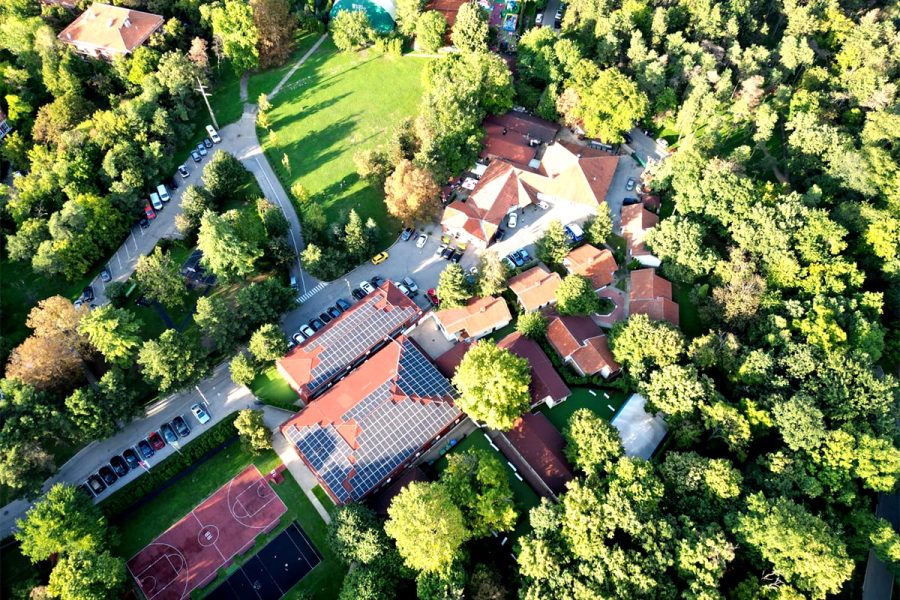Ruđer Bošković is a unique educational system that comprises the first private primary and secondary schools to be accredited by the Education Ministry of the Republic of Serbia and the International Baccalaureate Organisation
Apart from internationally recognised diplomas that open the doors to the world’s top educational institutions, Ruđer’s pupils receive high-quality general knowledge and skills. The learning process also unfolds beyond the classroom, through excursions, recreational classes, student exchanges, daytrips and camps for languages and various sports.
Ruđer Bošković last year celebrated its first 20 years of success, and today you have many reasons to be satisfied and proud.
— Our school is characterised by the latest teaching methods, the implementation of numerous extracurricular activities, but also classes limited to 10-20 pupils, while English is the language of instruction.

Apart from attending regular classes, pupils can also take advantage of numerous free-time activities in various fields: sport, dance, art (design, choir, film, dramatic art), foreign languages, linguistics, journalism, mathematics, physics, chemistry, history, ecology, chess and much more. The learning process also unfolds beyond the classroom, through excursions, recreational classes, student exchanges, daytrips and camps for languages and various sports.
Our school has also been successfully implementing the International Baccalaureate Diploma Programme since 2006 and our graduates are today studying at prestigious world universities like UCL, Warwick University, the London School of Economics, the University of Hong Kong and Bocconi University.
Is it important to you that your young graduates leave Ruđer fully prepared for their further studies and life in the 21st century?
— We strive to encourage creativity, problem solving, teamwork, entrepreneurship and communication skills, thus aligning our teaching with the competencies required for both further academic studies and the labour market. TWO DECADES OF KNOWHOW Ruđer Bošković is a unique educational system that comprises the first private primary and secondary schools to be accredited by the Education Ministry of the Republic of Serbia and the International Baccalaureate Organisation IVANA VUKMIRICA BAĆANOVIĆ Head of the Ruđer Bošković Secondary School.
It is important to you that your pupils discover their talents and proclivities; that they mutually connect. How do you encourage that?
— Our school has a comprehensive extracurricular programme (Creativity, Activity, Service – CAS), which represents a modern framework for experiential learning that’s conceived in such a way as to engage pupils in new life roles. An emphasis is placed on practical action that doesn’t take place in the classroom and through which activities with real life consequences unfold.

After carrying out the activities, the students are tasked with writing down their thoughts about what they’ve learned and how much they’ve been effected by what they’ve done, but also how it impacted other participants in the project. Such activities are aimed at encouraging expansions on, or the application of, that which has been learned in the classroom through regular subjects. This can mean applying scientific theories in the scope of environmental protection or applying technology to design items that will be helpful to certain social groups, such as people living with disabilities and the like.
One of the most important aspects of CAS is cooperating with others, doing joint work on projects, developing an awareness of oneself and others, volunteering and humanitarian work, all of which ennoble one’s personality in multiple ways and encourage self-confidence. The personal initiative and interests of pupils are brought to the fore, so it is actually their ideas that are implemented at the level of the class and passed on to future generations.
Our school has a Comprehensive extracurricular programme (CAS), which represents a modern framework for experiential learning that’s designed to engage pupils in new life roles
We’ve been organising international student exchanges since December 2016. We decided to launch these projects to give our pupils the opportunity to:
* gain international experience and lay the foundations for their future as responsible citizens of the modern world by staying with a host family and familiarising themselves with other cultures and customs, lifestyles and worldviews;
* acquire new skills, primarily those related to communication and cooperation, but also to develop a spirit of teamwork and personal initiative and responsibility;
* develop personally in order to be more open-minded, caring, communicative, courageous and predisposed to considering different perspectives.
Tuition fees at your school cover not only the costs of basic teaching services, but also additional services. What are all the elements encompassed by that?
— Tuition fees encompass regular classes, optional classes, seminars and research projects, preparatory classes, all of which are included in basic services, but also nutrition, healthcare and protection, security supervision, IT support, wardrobe services, textbooks, stationery, daytrips, visits and excursions.
You often note with pride that your pupils are principled, honourable and well-educated young people. What else characterises the typical ‘Ruđerian’?
— Our pupils approach the contents through a research spectrum. In the knowledge that they have ahead of them a need to handle themselves in a complex world of information, we teach them how to find and interpret it. With the development of their research skills, our pupils learn how to search literature and how to use and evaluate information effectively. Similarly, we also direct them towards exploring the world around them by identifying, understanding and using data gleaned from experts or peers.
In order for them to approach the learning process with understanding and due attention, we also develop the cognitive skills that are important for the development of creativity and a critical mindset. In developing such skills, our pupils evaluate the quality of various sources of data, but also the quality of their own learning process. They analyse their own strengths and weaknesses, but also begin considering alternative and creative ways of solving problems. Through cognitive skills, they become active participants in the learning process.
Communication skills are important for our pupils’ public appearances, discussions, written works and presentations. Through these activities, they learn to express themselves clearly, respect the opinions of others and accept feedback. Our pupils practice expressing themselves in multiple languages and respect academic forms of writing. As skilled communicators, they become adaptable to cooperation in different environments, with respect for cultural differences.
Through the development of social skills, our pupils learn to collaborate, delegate duties and take responsibility. It is particularly important for them to respect the contributions of others and understand their own role in the learning process or in a research project. Our pupils know what it means to accept a leadership role, but also how to collaborate and understand one another.
As active participants in learning and research processes, our pupils learn how to plan and organise their time and tasks, but also how to conquer new challenges, understand and overcome obstacles and interpret their own emotions. Through these skills of self-regulation, they develop a healthy and balanced attitude towards their tasks and their own strengths and weaknesses. We support them in this through regular consultations and by devising individual interventions that are able to benefit them, as well as through the careful planning and distribution of responsibilities.
Over the course of these twenty years, our pupils have participated in various competitions and demonstrated that they are talented in many areas. We can so far boast of significant achievements in mathematics, geography, linguistics and foreign languages.